Famous Americans
Famous Americans
A list of famous and influential people from the United States of America.
https://www.biographyonline.net/people/america/famous-americans.html
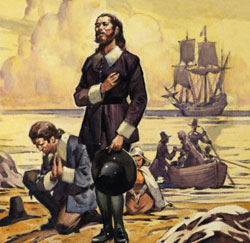 Pilgrims or the Pilgrim Fathers (17th Century) A group of early settlers who left England and founded a colony in Plymouth, Massachusetts, around 1620.
Pilgrims or the Pilgrim Fathers (17th Century) A group of early settlers who left England and founded a colony in Plymouth, Massachusetts, around 1620.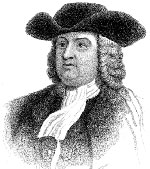 William Penn (1644 – 1718) In the Pennsylvania Frame of Government (1682), Penn included democratic principles and the principle of religious tolerance. Penn was also an early advocate for uniting the different colonies of America.
William Penn (1644 – 1718) In the Pennsylvania Frame of Government (1682), Penn included democratic principles and the principle of religious tolerance. Penn was also an early advocate for uniting the different colonies of America.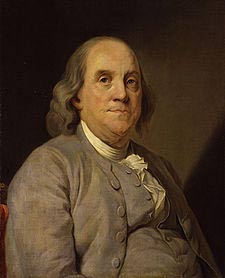 Benjamin Franklin (1706-1790) Author, politician, diplomat, scientist and statesman. Franklin urged the colonies to join together and one of the strongest supporters for the idea of a United States.
Benjamin Franklin (1706-1790) Author, politician, diplomat, scientist and statesman. Franklin urged the colonies to join together and one of the strongest supporters for the idea of a United States.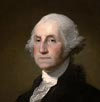 George Washington (1732–1799) Founding Father of the United States. Served as Commander in Chief of American forces during the War of Independence. Also elected the first President of the United States, serving for eight years (1789-1797).
George Washington (1732–1799) Founding Father of the United States. Served as Commander in Chief of American forces during the War of Independence. Also elected the first President of the United States, serving for eight years (1789-1797).
Thomas Paine (1737-1809)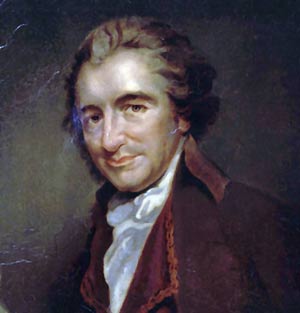 English-American writer and political activist. In 1776, he wrote the best selling pamphlet Common Sense. This advocated America seeking independence from Great Britain.
English-American writer and political activist. In 1776, he wrote the best selling pamphlet Common Sense. This advocated America seeking independence from Great Britain.
 English-American writer and political activist. In 1776, he wrote the best selling pamphlet Common Sense. This advocated America seeking independence from Great Britain.
English-American writer and political activist. In 1776, he wrote the best selling pamphlet Common Sense. This advocated America seeking independence from Great Britain. Thomas Jefferson (1743-1826) Founding Father and principal author ofThe Declaration of Independence (1776). Third President of the US, Jefferson helped to expand the territory of the US through the Louisiana Declaration(1803).
Thomas Jefferson (1743-1826) Founding Father and principal author ofThe Declaration of Independence (1776). Third President of the US, Jefferson helped to expand the territory of the US through the Louisiana Declaration(1803).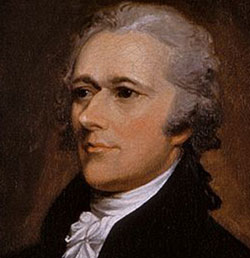 Alexander Hamilton (1755-1804) Founding Father, who served as a soldier, economist, and lawyer. The first United States Secretary of the Treasury, establishing a national bank, and taxation system. Negotiated trade deals with Great Britain.
Alexander Hamilton (1755-1804) Founding Father, who served as a soldier, economist, and lawyer. The first United States Secretary of the Treasury, establishing a national bank, and taxation system. Negotiated trade deals with Great Britain.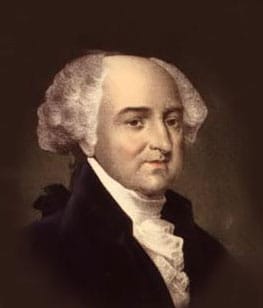 John Adams (1735-1826) Founding Father and the second US President. Adams assisted Thomas Jefferson in writing the Declaration of Independence and helped to pass the Declaration through Congress.
John Adams (1735-1826) Founding Father and the second US President. Adams assisted Thomas Jefferson in writing the Declaration of Independence and helped to pass the Declaration through Congress.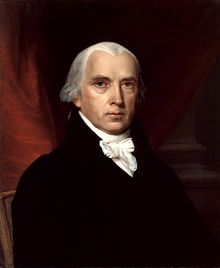 James Madison (1751-1836) Fourth president of the US (1809-1817) Drafted the US Constitution and the US Bill of Rights. In 1788, along with Hamilton and John Jay, he wrote the Federalist Papers.
James Madison (1751-1836) Fourth president of the US (1809-1817) Drafted the US Constitution and the US Bill of Rights. In 1788, along with Hamilton and John Jay, he wrote the Federalist Papers.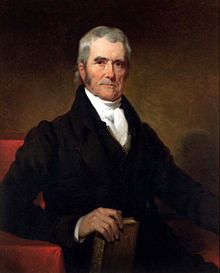 John Marshall (1755-1835) Influential fourth Chief Justice of the United States (1801-1835). His opinions helped to lay the framework for American constitutional law and the Supreme Court.
John Marshall (1755-1835) Influential fourth Chief Justice of the United States (1801-1835). His opinions helped to lay the framework for American constitutional law and the Supreme Court.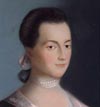 Abigail Adams (1744 – 1818) Adams was the wife and confident of John Adams. During the Wars of Independence, Adams wrote extensively to her husband offering advice and encouragement. Adams was an early advocate of human rights for both women and black Americans and is considered the first Second Lady of the United States.
Abigail Adams (1744 – 1818) Adams was the wife and confident of John Adams. During the Wars of Independence, Adams wrote extensively to her husband offering advice and encouragement. Adams was an early advocate of human rights for both women and black Americans and is considered the first Second Lady of the United States.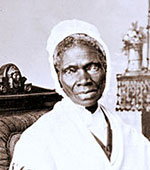 Sojourner Truth (1797 – 1883) African-American abolitionist and women’s rights campaigner. In 1851, gave a famous extemporaneous speech “Ain’t I a woman?” which explained in plain language how women were equal to men.
Sojourner Truth (1797 – 1883) African-American abolitionist and women’s rights campaigner. In 1851, gave a famous extemporaneous speech “Ain’t I a woman?” which explained in plain language how women were equal to men.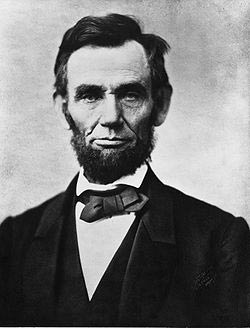 Abraham Lincoln (1809-1865) 16th President of the US from 1861-1865. He led the Union forces during the American civil war. Lincoln led the north to victory preserving the Union and passing a bill to abolish legal slavery.
Abraham Lincoln (1809-1865) 16th President of the US from 1861-1865. He led the Union forces during the American civil war. Lincoln led the north to victory preserving the Union and passing a bill to abolish legal slavery.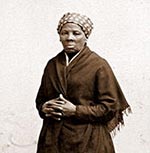 Harriet Tubman (1822 – 1913) Tubman escaped from slavery but returned on many dangerous missions to Maryland where she helped lead slaves to freedom. She also served as agent and leader during the Civil War. She became a symbol of the abolition movement.
Harriet Tubman (1822 – 1913) Tubman escaped from slavery but returned on many dangerous missions to Maryland where she helped lead slaves to freedom. She also served as agent and leader during the Civil War. She became a symbol of the abolition movement.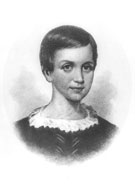 Emily Dickinson (1830–1886) One of America’s greatest poets, Emily Dickinson lived most of her life in seclusion. Her poems were published posthumously and received widespread literary praise for their bold and unconventional style. Her poetic style left a significant legacy on 20th Century poetry.
Emily Dickinson (1830–1886) One of America’s greatest poets, Emily Dickinson lived most of her life in seclusion. Her poems were published posthumously and received widespread literary praise for their bold and unconventional style. Her poetic style left a significant legacy on 20th Century poetry.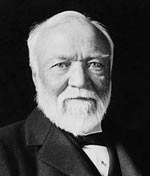 Andrew Carnegie (1835 – 1919) Carnegie became very rich, through his control of the US steel industry and other investments. With his wealth, he became a philanthropist. Many public libraries are named after him.
Andrew Carnegie (1835 – 1919) Carnegie became very rich, through his control of the US steel industry and other investments. With his wealth, he became a philanthropist. Many public libraries are named after him.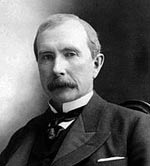 John D. Rockefeller (1839 – 1937) Rockefeller was a successful businessman who controlled much of the US oil and railroad industries. His name became synonymous with wealth and economic power.
John D. Rockefeller (1839 – 1937) Rockefeller was a successful businessman who controlled much of the US oil and railroad industries. His name became synonymous with wealth and economic power.
Thomas Edison (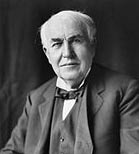 1847 – 1931) Pioneer of the mass use and distribution of electricity. Edison was one of the most prolific inventors, who developed commercially available electric light bulbs.
1847 – 1931) Pioneer of the mass use and distribution of electricity. Edison was one of the most prolific inventors, who developed commercially available electric light bulbs.
 1847 – 1931) Pioneer of the mass use and distribution of electricity. Edison was one of the most prolific inventors, who developed commercially available electric light bulbs.
1847 – 1931) Pioneer of the mass use and distribution of electricity. Edison was one of the most prolific inventors, who developed commercially available electric light bulbs.
Woodrow Wilson (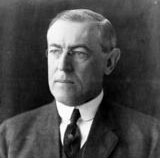 1856 – 1924) US president. Wilson was President during the First World War. His idealistic 14 points formed the basis for the League of Nations, the forerunner of the United Nations.
1856 – 1924) US president. Wilson was President during the First World War. His idealistic 14 points formed the basis for the League of Nations, the forerunner of the United Nations.
 1856 – 1924) US president. Wilson was President during the First World War. His idealistic 14 points formed the basis for the League of Nations, the forerunner of the United Nations.
1856 – 1924) US president. Wilson was President during the First World War. His idealistic 14 points formed the basis for the League of Nations, the forerunner of the United Nations.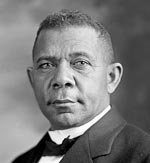 Booker T. Washington (1856 – 1915) Author and orator, Washington was an adviser to the presidents of Roosevelt and Taft. He was the de facto leader of African-Americans. He advocated an incremental approach to improving education and life prospects of black Americans.
Booker T. Washington (1856 – 1915) Author and orator, Washington was an adviser to the presidents of Roosevelt and Taft. He was the de facto leader of African-Americans. He advocated an incremental approach to improving education and life prospects of black Americans.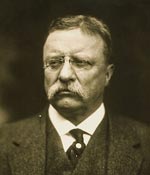 Theodore Roosevelt (1858 – 1919) President (1901-09) Roosevelt was a leading political figure of the Progressive Era – fighting corruption and the power of monopoly trusts. As President, he challenged corruption and monopoly power. He also created the first American Natural Parks and pursued a more activist US foreign policy, building up the navy.
Theodore Roosevelt (1858 – 1919) President (1901-09) Roosevelt was a leading political figure of the Progressive Era – fighting corruption and the power of monopoly trusts. As President, he challenged corruption and monopoly power. He also created the first American Natural Parks and pursued a more activist US foreign policy, building up the navy.
Henry Ford 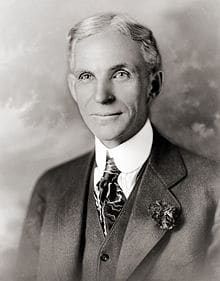 (1864-1947) Founder of Ford motor company. Ford pioneered the use of the assembly line for making cars, helping to reduce the price and make cars affordable for the average American consumer.
(1864-1947) Founder of Ford motor company. Ford pioneered the use of the assembly line for making cars, helping to reduce the price and make cars affordable for the average American consumer.
 (1864-1947) Founder of Ford motor company. Ford pioneered the use of the assembly line for making cars, helping to reduce the price and make cars affordable for the average American consumer.
(1864-1947) Founder of Ford motor company. Ford pioneered the use of the assembly line for making cars, helping to reduce the price and make cars affordable for the average American consumer.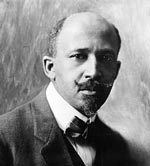 W.E.B. Du Bois (1868 – 1963) Du Bois was an influential African-American activist who sought to campaign for full equality between blacks and whites. He rejected the Atlanta compromise of 1909 but insisted on full equality. Thought little change was achieved in the ‘Progressive Era’, Du Bois laid the framework for the NAACP and future civil rights movements.
W.E.B. Du Bois (1868 – 1963) Du Bois was an influential African-American activist who sought to campaign for full equality between blacks and whites. He rejected the Atlanta compromise of 1909 but insisted on full equality. Thought little change was achieved in the ‘Progressive Era’, Du Bois laid the framework for the NAACP and future civil rights movements.
Wright Brothers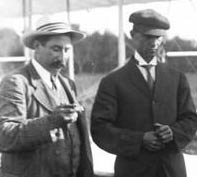 Orville (1871 – 1948) and Wilbur (1867 – 1912) who successfully made the first powered air flight in 1903. They continued to develop aeroplanes ushering in a new world of flight.
Orville (1871 – 1948) and Wilbur (1867 – 1912) who successfully made the first powered air flight in 1903. They continued to develop aeroplanes ushering in a new world of flight.
 Orville (1871 – 1948) and Wilbur (1867 – 1912) who successfully made the first powered air flight in 1903. They continued to develop aeroplanes ushering in a new world of flight.
Orville (1871 – 1948) and Wilbur (1867 – 1912) who successfully made the first powered air flight in 1903. They continued to develop aeroplanes ushering in a new world of flight.
Franklin D. Roosevelt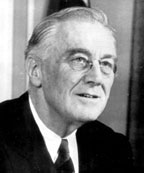 (1882 – 1945) – US President 1932 – 1945. The longest serving US President, Roosevelt came to power during the crisis of the 1932 recession. He expanded federal government to deal with the crisis and oversaw the US entry into the Second World War.
(1882 – 1945) – US President 1932 – 1945. The longest serving US President, Roosevelt came to power during the crisis of the 1932 recession. He expanded federal government to deal with the crisis and oversaw the US entry into the Second World War.
 (1882 – 1945) – US President 1932 – 1945. The longest serving US President, Roosevelt came to power during the crisis of the 1932 recession. He expanded federal government to deal with the crisis and oversaw the US entry into the Second World War.
(1882 – 1945) – US President 1932 – 1945. The longest serving US President, Roosevelt came to power during the crisis of the 1932 recession. He expanded federal government to deal with the crisis and oversaw the US entry into the Second World War.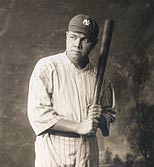 Babe Ruth (1895 – 1948) Iconic baseball player. Babe Ruth was one of the greatest baseball players whose popularity transcended sport and epitomised the Roaring Twenties.
Babe Ruth (1895 – 1948) Iconic baseball player. Babe Ruth was one of the greatest baseball players whose popularity transcended sport and epitomised the Roaring Twenties.
Amelia Earhart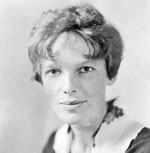 (1897– 1937) – Female aviator. She broke several records and became the first woman to fly solo across the Atlantic in 1932. She disappeared whilst attempting to circumnavigate the world.
(1897– 1937) – Female aviator. She broke several records and became the first woman to fly solo across the Atlantic in 1932. She disappeared whilst attempting to circumnavigate the world.
 (1897– 1937) – Female aviator. She broke several records and became the first woman to fly solo across the Atlantic in 1932. She disappeared whilst attempting to circumnavigate the world.
(1897– 1937) – Female aviator. She broke several records and became the first woman to fly solo across the Atlantic in 1932. She disappeared whilst attempting to circumnavigate the world.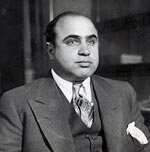 Al Capone (1899-1947) American gangster who rose to fame during the prohibition era. He was an uncompromising boss of the Chicago Outfit – behind the St Valentine’s Day Massacre. Eventually convicted of income tax evasion. Capone is an iconic representative of the mafia mobster.
Al Capone (1899-1947) American gangster who rose to fame during the prohibition era. He was an uncompromising boss of the Chicago Outfit – behind the St Valentine’s Day Massacre. Eventually convicted of income tax evasion. Capone is an iconic representative of the mafia mobster.
Ernest Hemingway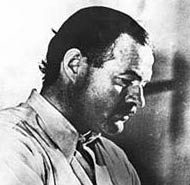 (1899 – 1961) American author and journalist. He wrote many classics of modern American literature, including ‘For Whom the Bell Tolls’
(1899 – 1961) American author and journalist. He wrote many classics of modern American literature, including ‘For Whom the Bell Tolls’
 (1899 – 1961) American author and journalist. He wrote many classics of modern American literature, including ‘For Whom the Bell Tolls’
(1899 – 1961) American author and journalist. He wrote many classics of modern American literature, including ‘For Whom the Bell Tolls’ Alfred Hitchcock (1899 – 1980) – English / American film producer. Hitchcock is considered the master film director, producing some of Hollywood’s greatest films, such as Psycho, Rear Window and Birds
Alfred Hitchcock (1899 – 1980) – English / American film producer. Hitchcock is considered the master film director, producing some of Hollywood’s greatest films, such as Psycho, Rear Window and Birds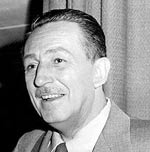 Walt Disney (1901 – 1966) American film producer
Walt Disney (1901 – 1966) American film producerand creator of cartoon characters such as Mickey Mouse. Walt Disney pioneered the successful film portrayal of classic fairy tales, such as Snow White and the Seven Dwarfs.
Katherine Hepburn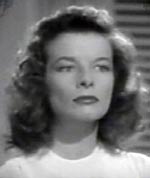 (1907-2003) – American actress. Fiercely independent, Hepburn was a commanding influence in Hollywood for over four decades. She received four Oscars and another eight nominations.
(1907-2003) – American actress. Fiercely independent, Hepburn was a commanding influence in Hollywood for over four decades. She received four Oscars and another eight nominations.
 (1907-2003) – American actress. Fiercely independent, Hepburn was a commanding influence in Hollywood for over four decades. She received four Oscars and another eight nominations.
(1907-2003) – American actress. Fiercely independent, Hepburn was a commanding influence in Hollywood for over four decades. She received four Oscars and another eight nominations.
Lyndon Johnson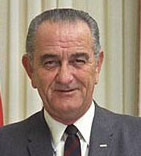 (1908 – 1973) – US President 1963-69. Johnson took over from the assassinated JFK. He expanded America’s role in Vietnam. Domestically he introduced civil rights legislation.
(1908 – 1973) – US President 1963-69. Johnson took over from the assassinated JFK. He expanded America’s role in Vietnam. Domestically he introduced civil rights legislation.
 (1908 – 1973) – US President 1963-69. Johnson took over from the assassinated JFK. He expanded America’s role in Vietnam. Domestically he introduced civil rights legislation.
(1908 – 1973) – US President 1963-69. Johnson took over from the assassinated JFK. He expanded America’s role in Vietnam. Domestically he introduced civil rights legislation.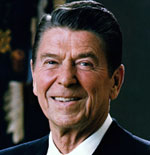 Ronald Reagan (1911 – 2004) – US President (1980 – 1988) Reagan sought to roll back the frontiers of the state and pursued an aggressive anti-Communist foreign policy.
Ronald Reagan (1911 – 2004) – US President (1980 – 1988) Reagan sought to roll back the frontiers of the state and pursued an aggressive anti-Communist foreign policy.
Jesse Owens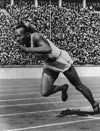 (1913-1980) US athlete. Owens was an iconic figure at the 1936 Olympic Games in Berlin. He won gold in the 100 meters.
(1913-1980) US athlete. Owens was an iconic figure at the 1936 Olympic Games in Berlin. He won gold in the 100 meters.
 (1913-1980) US athlete. Owens was an iconic figure at the 1936 Olympic Games in Berlin. He won gold in the 100 meters.
(1913-1980) US athlete. Owens was an iconic figure at the 1936 Olympic Games in Berlin. He won gold in the 100 meters.
Billie Holiday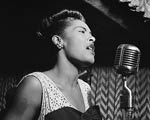 (1915 – 1959) Influential and iconic jazz and blues singer. Nicknamed ‘Lady Day’ she developed a unique and haunting voice, influenced by the jazz musicians she played with.
(1915 – 1959) Influential and iconic jazz and blues singer. Nicknamed ‘Lady Day’ she developed a unique and haunting voice, influenced by the jazz musicians she played with.
 (1915 – 1959) Influential and iconic jazz and blues singer. Nicknamed ‘Lady Day’ she developed a unique and haunting voice, influenced by the jazz musicians she played with.
(1915 – 1959) Influential and iconic jazz and blues singer. Nicknamed ‘Lady Day’ she developed a unique and haunting voice, influenced by the jazz musicians she played with.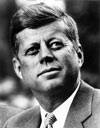 John F. Kennedy (1917 – 1963) US President. Elected in 1960, Kennedy was seen as a young dynamic President who offered a new hope to the US and the world. He played a role in diffusing the Cuban missile crisis and the threat of nuclear war.
John F. Kennedy (1917 – 1963) US President. Elected in 1960, Kennedy was seen as a young dynamic President who offered a new hope to the US and the world. He played a role in diffusing the Cuban missile crisis and the threat of nuclear war.
Malcolm X (1925 – 1965) American Black nationalist leader. Malcolm X was, for a time, a leader of the Nation of Islam which advocated a radical response to racism and a separate nation for blacks and whites.
(1925 – 1965) American Black nationalist leader. Malcolm X was, for a time, a leader of the Nation of Islam which advocated a radical response to racism and a separate nation for blacks and whites.
 (1925 – 1965) American Black nationalist leader. Malcolm X was, for a time, a leader of the Nation of Islam which advocated a radical response to racism and a separate nation for blacks and whites.
(1925 – 1965) American Black nationalist leader. Malcolm X was, for a time, a leader of the Nation of Islam which advocated a radical response to racism and a separate nation for blacks and whites.
Marilyn Monroe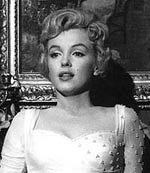 (1926 – 1962) American actress / singer / model. Monroe starred in several films and was the biggest star of her generation. She died in 1962 from a drugs overdose.
(1926 – 1962) American actress / singer / model. Monroe starred in several films and was the biggest star of her generation. She died in 1962 from a drugs overdose.
 (1926 – 1962) American actress / singer / model. Monroe starred in several films and was the biggest star of her generation. She died in 1962 from a drugs overdose.
(1926 – 1962) American actress / singer / model. Monroe starred in several films and was the biggest star of her generation. She died in 1962 from a drugs overdose.
Martin Luther King 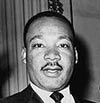 (1929 – 1968) – American civil rights campaigner. Martin Luther King led the non-violent civil rights movement. His powerful oratory helped to lay the foundations for sweeping change and an end to the segregation in the Deep South.
(1929 – 1968) – American civil rights campaigner. Martin Luther King led the non-violent civil rights movement. His powerful oratory helped to lay the foundations for sweeping change and an end to the segregation in the Deep South.
 (1929 – 1968) – American civil rights campaigner. Martin Luther King led the non-violent civil rights movement. His powerful oratory helped to lay the foundations for sweeping change and an end to the segregation in the Deep South.
(1929 – 1968) – American civil rights campaigner. Martin Luther King led the non-violent civil rights movement. His powerful oratory helped to lay the foundations for sweeping change and an end to the segregation in the Deep South.
Jacqueline Kennedy Onassis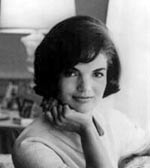 (1929 – 1994) – wife of JF. Kennedy. Under her direction, she helped to modernise the White House and was a popular counterpart to JFK’s presidency.
(1929 – 1994) – wife of JF. Kennedy. Under her direction, she helped to modernise the White House and was a popular counterpart to JFK’s presidency.
 (1929 – 1994) – wife of JF. Kennedy. Under her direction, she helped to modernise the White House and was a popular counterpart to JFK’s presidency.
(1929 – 1994) – wife of JF. Kennedy. Under her direction, she helped to modernise the White House and was a popular counterpart to JFK’s presidency.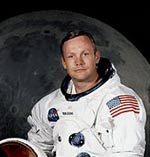 Neil Armstrong (1930 – 2012) US Pilot and astronaut. In 1969, Armstrong and Buzz Aldrin became the first men to successful land and walk on the moon, giving the memorable quote. “That’s one small step for man, one giant leap for mankind. “
Neil Armstrong (1930 – 2012) US Pilot and astronaut. In 1969, Armstrong and Buzz Aldrin became the first men to successful land and walk on the moon, giving the memorable quote. “That’s one small step for man, one giant leap for mankind. “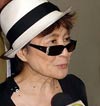 Yoko Ono (1933- ) US artist, musician. Married John Lennon, star of the Beatles. Yoko Ono was a musician and fashion icon.
Yoko Ono (1933- ) US artist, musician. Married John Lennon, star of the Beatles. Yoko Ono was a musician and fashion icon.
Elvis Presley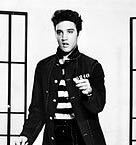 (1935 – 1977) American pop singer. Elvis Presley helped to revolutionise American pop music becoming an idol for millions in the 1950s and 1960s.
(1935 – 1977) American pop singer. Elvis Presley helped to revolutionise American pop music becoming an idol for millions in the 1950s and 1960s.
 (1935 – 1977) American pop singer. Elvis Presley helped to revolutionise American pop music becoming an idol for millions in the 1950s and 1960s.
(1935 – 1977) American pop singer. Elvis Presley helped to revolutionise American pop music becoming an idol for millions in the 1950s and 1960s.
Muhammad Ali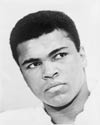 (1942 – ) American Boxer and civil rights campaigner. Ali became undisputed Heavy Weight Champion of the world. His refusal to fight in Vietnam caused him to be banned from the sport. But, he came back, reclaiming his title.
(1942 – ) American Boxer and civil rights campaigner. Ali became undisputed Heavy Weight Champion of the world. His refusal to fight in Vietnam caused him to be banned from the sport. But, he came back, reclaiming his title.
 (1942 – ) American Boxer and civil rights campaigner. Ali became undisputed Heavy Weight Champion of the world. His refusal to fight in Vietnam caused him to be banned from the sport. But, he came back, reclaiming his title.
(1942 – ) American Boxer and civil rights campaigner. Ali became undisputed Heavy Weight Champion of the world. His refusal to fight in Vietnam caused him to be banned from the sport. But, he came back, reclaiming his title.
Billie Jean King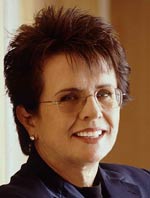 (1943 – ) – American tennis players and campaigner for equality. Billie Jean King won 12 single grand slam titles. She also campaigned for women’s equality and beat Bobby Riggs in a high profile, ‘Battle of the Sexes’ tennis match.
(1943 – ) – American tennis players and campaigner for equality. Billie Jean King won 12 single grand slam titles. She also campaigned for women’s equality and beat Bobby Riggs in a high profile, ‘Battle of the Sexes’ tennis match.
 (1943 – ) – American tennis players and campaigner for equality. Billie Jean King won 12 single grand slam titles. She also campaigned for women’s equality and beat Bobby Riggs in a high profile, ‘Battle of the Sexes’ tennis match.
(1943 – ) – American tennis players and campaigner for equality. Billie Jean King won 12 single grand slam titles. She also campaigned for women’s equality and beat Bobby Riggs in a high profile, ‘Battle of the Sexes’ tennis match.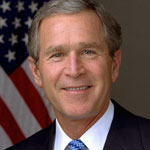 George Bush jnr (1946 – ) US President 2000-2008. President during the 9/11 terrorist attacks, he subsequently led a US invasion of Iraq.
George Bush jnr (1946 – ) US President 2000-2008. President during the 9/11 terrorist attacks, he subsequently led a US invasion of Iraq. Donald Trump (1946 – ) US business magnate, investor, television personality and 45th president of the US. Trump ran a divisive campaign on subjects of immigration, trade and tax cuts.
Donald Trump (1946 – ) US business magnate, investor, television personality and 45th president of the US. Trump ran a divisive campaign on subjects of immigration, trade and tax cuts.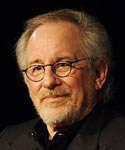 Steven Spielberg (1946 – ) Influential filmmaker who began with popular blockbusters —Jaws (1975), E.T. the Extra-Terrestrial (1982), and Jurassic Park (1993) and influential films such as – Schindler’s List (1993) and Lincoln (2012)
Steven Spielberg (1946 – ) Influential filmmaker who began with popular blockbusters —Jaws (1975), E.T. the Extra-Terrestrial (1982), and Jurassic Park (1993) and influential films such as – Schindler’s List (1993) and Lincoln (2012)
Hilary Clinton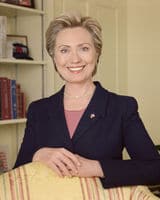 (1947 – ) US politician who became the first women to run for the office of US president for a major political party (Democrats). Also served as Secretary of State from 2009 to 2013. First lady for husband Bill Clinton.
(1947 – ) US politician who became the first women to run for the office of US president for a major political party (Democrats). Also served as Secretary of State from 2009 to 2013. First lady for husband Bill Clinton.
 (1947 – ) US politician who became the first women to run for the office of US president for a major political party (Democrats). Also served as Secretary of State from 2009 to 2013. First lady for husband Bill Clinton.
(1947 – ) US politician who became the first women to run for the office of US president for a major political party (Democrats). Also served as Secretary of State from 2009 to 2013. First lady for husband Bill Clinton.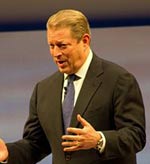 Al Gore (1948 – ) – US presidential candidate and environmental campaigner. He narrowly lost the 2000 election to George Bush and afterwards concentrated on environmental issues. Gore produced a film ‘An inconvenient truth’ about global warming.
Al Gore (1948 – ) – US presidential candidate and environmental campaigner. He narrowly lost the 2000 election to George Bush and afterwards concentrated on environmental issues. Gore produced a film ‘An inconvenient truth’ about global warming.
Paul Krugman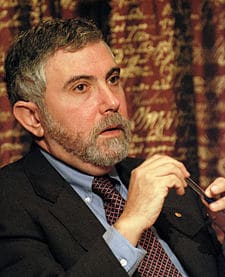 (1953 – ) – Nobel Prize winning economist. Krugman rose to prominence through his attacks on the politics of George Bush. After the financial crisis, he became a prominent advocate of Keynesian economics.
(1953 – ) – Nobel Prize winning economist. Krugman rose to prominence through his attacks on the politics of George Bush. After the financial crisis, he became a prominent advocate of Keynesian economics.
 (1953 – ) – Nobel Prize winning economist. Krugman rose to prominence through his attacks on the politics of George Bush. After the financial crisis, he became a prominent advocate of Keynesian economics.
(1953 – ) – Nobel Prize winning economist. Krugman rose to prominence through his attacks on the politics of George Bush. After the financial crisis, he became a prominent advocate of Keynesian economics.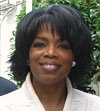 Oprah Winfrey (1954 – ) US media celebrity. Oprah Winfrey launched an influential chat show which became one of the most watched TV shows. This led to spin-offs, such as the Oprah book club.
Oprah Winfrey (1954 – ) US media celebrity. Oprah Winfrey launched an influential chat show which became one of the most watched TV shows. This led to spin-offs, such as the Oprah book club.
Michael Moore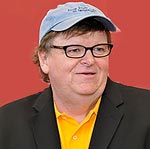 (1954 – ) US film producer and political activist. Michael Moore has produced films criticising the inequalities of capitalism and globalisation. He has also investigated the US health industry (Sicko) and the American attitude to guns (Bowling for Columbine)
(1954 – ) US film producer and political activist. Michael Moore has produced films criticising the inequalities of capitalism and globalisation. He has also investigated the US health industry (Sicko) and the American attitude to guns (Bowling for Columbine)
 (1954 – ) US film producer and political activist. Michael Moore has produced films criticising the inequalities of capitalism and globalisation. He has also investigated the US health industry (Sicko) and the American attitude to guns (Bowling for Columbine)
(1954 – ) US film producer and political activist. Michael Moore has produced films criticising the inequalities of capitalism and globalisation. He has also investigated the US health industry (Sicko) and the American attitude to guns (Bowling for Columbine)
Bill Gates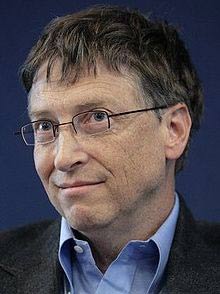 (1955 – ) American businessman, founder of Microsoft. Gates became one of richest men in the world. Recently he has concentrated on philanthropic endeavours.
(1955 – ) American businessman, founder of Microsoft. Gates became one of richest men in the world. Recently he has concentrated on philanthropic endeavours.
 (1955 – ) American businessman, founder of Microsoft. Gates became one of richest men in the world. Recently he has concentrated on philanthropic endeavours.
(1955 – ) American businessman, founder of Microsoft. Gates became one of richest men in the world. Recently he has concentrated on philanthropic endeavours.
Carl Lewis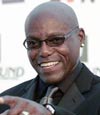 (1961 – ) – US athlete and Olympian. Carl Lewis won nine gold medals in the 100-metres, 100-metre relay and long jump.
(1961 – ) – US athlete and Olympian. Carl Lewis won nine gold medals in the 100-metres, 100-metre relay and long jump.
 (1961 – ) – US athlete and Olympian. Carl Lewis won nine gold medals in the 100-metres, 100-metre relay and long jump.
(1961 – ) – US athlete and Olympian. Carl Lewis won nine gold medals in the 100-metres, 100-metre relay and long jump.
Madonna (1958 – ) American pop singer. Madonna pushed the boundaries of music video, developing a new genre which has widely been imitated.
(1958 – ) American pop singer. Madonna pushed the boundaries of music video, developing a new genre which has widely been imitated.
 (1958 – ) American pop singer. Madonna pushed the boundaries of music video, developing a new genre which has widely been imitated.
(1958 – ) American pop singer. Madonna pushed the boundaries of music video, developing a new genre which has widely been imitated.
Michael Jackson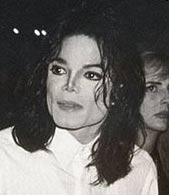 (1958 – 2009) American pop singer. Initially starting off with the Jackson Five, Michael pursued his own solo career, becoming one of the best selling artists of all time.
(1958 – 2009) American pop singer. Initially starting off with the Jackson Five, Michael pursued his own solo career, becoming one of the best selling artists of all time.
 (1958 – 2009) American pop singer. Initially starting off with the Jackson Five, Michael pursued his own solo career, becoming one of the best selling artists of all time.
(1958 – 2009) American pop singer. Initially starting off with the Jackson Five, Michael pursued his own solo career, becoming one of the best selling artists of all time.
Barack Obama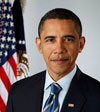 (1961- ) US President 2008-2016. Obama was the first black President and elected on a tide of optimism.
(1961- ) US President 2008-2016. Obama was the first black President and elected on a tide of optimism.
 (1961- ) US President 2008-2016. Obama was the first black President and elected on a tide of optimism.
(1961- ) US President 2008-2016. Obama was the first black President and elected on a tide of optimism.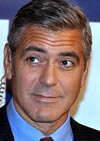 George Clooney (1961 ) American actor, director and political activist. Clooney played the lead role in films such as Batman and Robin (1997) and Ocean’s Eleven. He went on to direct his own films. He also raises money and awareness for various charities.
George Clooney (1961 ) American actor, director and political activist. Clooney played the lead role in films such as Batman and Robin (1997) and Ocean’s Eleven. He went on to direct his own films. He also raises money and awareness for various charities. Jon Stewart (1962 – ) – Comic and tv presenter from New York. Jon Stewart hosts the influential and popular ‘Daily Show.’ His biting satire and criticism of mainstream media has made it a hit on tv ratings.
Jon Stewart (1962 – ) – Comic and tv presenter from New York. Jon Stewart hosts the influential and popular ‘Daily Show.’ His biting satire and criticism of mainstream media has made it a hit on tv ratings.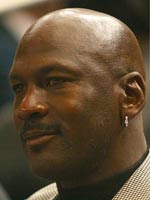 Michael Jordon (1963 – ) Legendary basketball player. In a career spanning nearly 20 years, he won 6 NBA titles with the Chicago Bulls. He is widely considered the greatest basketball player of all time and his public profile helped raise the global image of the game.
Michael Jordon (1963 – ) Legendary basketball player. In a career spanning nearly 20 years, he won 6 NBA titles with the Chicago Bulls. He is widely considered the greatest basketball player of all time and his public profile helped raise the global image of the game.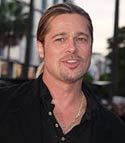 Brad Pitt (1963 – ) Actor and director. Pitt has been nominated for four Oscars and five Golden Globes. Pitt is one of most famous celebrities and married Angelina Jolie in 2014.
Brad Pitt (1963 – ) Actor and director. Pitt has been nominated for four Oscars and five Golden Globes. Pitt is one of most famous celebrities and married Angelina Jolie in 2014.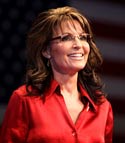 Sarah Palin (1964 – ) Republican party Governor of Alaska. Vice-Presidential candidate in 2008 election. Seen as a prominent figure in the right-wing ‘Tea Party’ movement, within the Republican party.
Sarah Palin (1964 – ) Republican party Governor of Alaska. Vice-Presidential candidate in 2008 election. Seen as a prominent figure in the right-wing ‘Tea Party’ movement, within the Republican party. Jimmy Wales (1966 – ) – Internet entrepreneur. He is the creator of the ‘non-profit’ Wikipedia – the world’s largest online internet encyclopaedia.
Jimmy Wales (1966 – ) – Internet entrepreneur. He is the creator of the ‘non-profit’ Wikipedia – the world’s largest online internet encyclopaedia.
Lance Armstrong (1971- ) American cyclist. After surviving cancer, he won the Tour de France 7 times, before being stripped of his titles for doping.
(1971- ) American cyclist. After surviving cancer, he won the Tour de France 7 times, before being stripped of his titles for doping.
 (1971- ) American cyclist. After surviving cancer, he won the Tour de France 7 times, before being stripped of his titles for doping.
(1971- ) American cyclist. After surviving cancer, he won the Tour de France 7 times, before being stripped of his titles for doping. Larry Page (1973- ) Computer scientist. Co-founder of Google. Larry Page invented ‘Page Rank’ an influential tool that helped give Google search a competitive advantage.
Larry Page (1973- ) Computer scientist. Co-founder of Google. Larry Page invented ‘Page Rank’ an influential tool that helped give Google search a competitive advantage.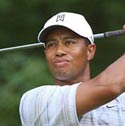 Tiger Woods (1975- ) – golfer. Became the world’s number one golfer and dominated the sport through the 2000s. Personal problems caused him to lose his number one position, but since 2011, he has made a strong comeback. He has currently 79 PGA titles.
Tiger Woods (1975- ) – golfer. Became the world’s number one golfer and dominated the sport through the 2000s. Personal problems caused him to lose his number one position, but since 2011, he has made a strong comeback. He has currently 79 PGA titles. Angelina Jolie (1975 – ) Starred in the popular Lara Croft film series. As well as acting, Jolie is active in charitable activities.
Angelina Jolie (1975 – ) Starred in the popular Lara Croft film series. As well as acting, Jolie is active in charitable activities. Beyonce Knowles (1981 – ) American singer, dancer and actress. Rose to fame as lead singer in R&B group ‘Destiny’s Child’ Has since gone on to a successful solo career.
Beyonce Knowles (1981 – ) American singer, dancer and actress. Rose to fame as lead singer in R&B group ‘Destiny’s Child’ Has since gone on to a successful solo career. Scarlett Johansson (1984 – ) – American actress, model and singer.
Scarlett Johansson (1984 – ) – American actress, model and singer. Lady Gaga (1986-) American singer, songwriter, activist, actress, and fashion designer. Known for her flamboyant stage performances.
Lady Gaga (1986-) American singer, songwriter, activist, actress, and fashion designer. Known for her flamboyant stage performances.
Citation: Pettinger, Tejvan. “Famous Americans”, Oxford, www.biographyonline.net, 23 January 2014. Last updated 5 March 2018.
The Constitution of the United States of America
America – Teacher’s Edition
America – Teacher’s Edition at Amazon
Tales of Famous Americans
Tales of Famous Americans at Amazon
Periods in American history
 People of The American Revolution (1775 – 1783) Leading figures in the American Revolution. Includes military leaders, philosophers, British protagonists and ordinary people. List includes; George Washington, Thomas Jefferson, George III and Benjamin Franklin.
People of The American Revolution (1775 – 1783) Leading figures in the American Revolution. Includes military leaders, philosophers, British protagonists and ordinary people. List includes; George Washington, Thomas Jefferson, George III and Benjamin Franklin.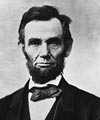 People of The American Civil War (1861-65) A list of over 20 famous and influential figures in the American Civil War (1861 – 1865) Includes politicians, generals, soldiers, spies and social activists. Including; Abraham Lincoln, Jefferson Davis, Robert E. Lee and Ulysses S. Grant.
People of The American Civil War (1861-65) A list of over 20 famous and influential figures in the American Civil War (1861 – 1865) Includes politicians, generals, soldiers, spies and social activists. Including; Abraham Lincoln, Jefferson Davis, Robert E. Lee and Ulysses S. Grant. The Gilded Age (1870 to 1900) A period of rapid expansion in the economy, with growing inequality. Includes the great industrialists, such as J.D. Rockefeller, J.P. Morgan and Andrew Carnegie.
The Gilded Age (1870 to 1900) A period of rapid expansion in the economy, with growing inequality. Includes the great industrialists, such as J.D. Rockefeller, J.P. Morgan and Andrew Carnegie. People of the Progressive Era (1890-1920) A period of increased federal intervention to tackle abuse of monopoly power and inequality. The Progressive Era also saw women gain the vote, and increased efforts to tackle corruption.
People of the Progressive Era (1890-1920) A period of increased federal intervention to tackle abuse of monopoly power and inequality. The Progressive Era also saw women gain the vote, and increased efforts to tackle corruption. People who built America A look at people who helped build American – from the Founding Fathers of the American Revolution to the modern technological age.
People who built America A look at people who helped build American – from the Founding Fathers of the American Revolution to the modern technological age.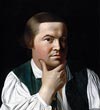 Facts about the American Revolution. The key events, people and battles which shaped the American War of Independence. Includes principal figures, such as George Washington, Thomas Jefferson and King George III.
Facts about the American Revolution. The key events, people and battles which shaped the American War of Independence. Includes principal figures, such as George Washington, Thomas Jefferson and King George III.
Other famous Americans to be added
- Walt Whitman
- Emily Dickinson
- Ralph Waldo Emerson
- Henry David Thoreau
- Mark Twain
- Harriet Beecher Stowe
- George S. Patton
- Richard M. Nixon
- Nikola Tesla
- Arnold Schwarzenegger
- Steve Jobs
- Maya Angelou
- Susan B. Anthony
- Rosa Parks
- Eleanor Roosevelt
- Dwight D. Eisenhower
- Bill Clinton
Related
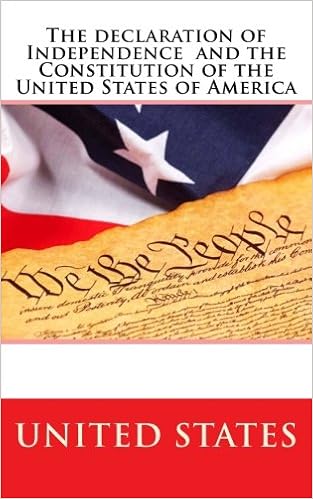



Comments
Post a Comment